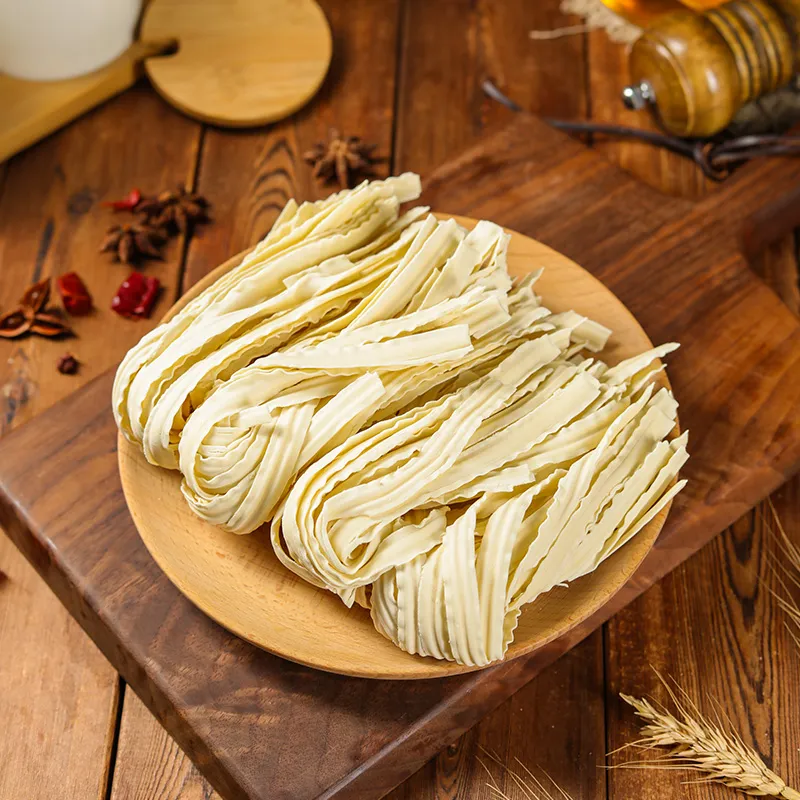dried udon noodles
The Delight of Dried Udon Noodles A Culinary Journey
Udon noodles, a beloved staple in Japanese cuisine, are cherished for their thick, chewy texture and versatility. While freshly made udon holds a special place in the hearts of many, dried udon noodles offer a convenient and equally delightful alternative that allows home cooks to enjoy this traditional dish without the need for extensive preparation. In this article, we explore the origins, preparation methods, culinary uses, and the unique charm of dried udon noodles.
Origins and Types of Udon Noodles
Originating from Japan, udon noodles are made from wheat flour, water, and salt. Their history dates back centuries, and various regional styles have emerged over time. Dried udon, as the name suggests, is dehydrated and can be stored for an extended period, making it a practical pantry staple. This form of udon typically comes in two varieties flat and round. While both types can be used interchangeably in recipes, the choice may depend on the desired texture and presentation.
Cooking Dried Udon Noodles
One of the remarkable features of dried udon noodles is their simplicity in preparation. To cook dried udon, start by bringing a pot of water to a rolling boil. Add the noodles and let them cook for about 8 to 12 minutes, depending on the thickness and brand. It’s essential to stir occasionally to prevent the noodles from sticking together. Once cooked to your desired tenderness, drain them and rinse briefly under cold water to stop the cooking process.
Though this cooking method is quick, ensuring that the noodles maintain their chewy texture is key. Overcooking can lead to a mushy result, while undercooking can leave the noodles tough. Therefore, it's crucial to check for doneness a minute or so before the recommended cooking time is complete.
dried udon noodles

Culinary Uses of Dried Udon Noodles
Dried udon noodles are incredibly versatile and can be used in a myriad of dishes. One of the most popular ways to enjoy them is in a hot udon soup. Typically, the cooked noodles are submerged in a flavorful broth made from dashi, soy sauce, and mirin, then topped with ingredients like green onions, tempura, mushrooms, and even a soft-boiled egg. The warmth of the soup combined with the chewy texture of the noodles creates a comforting experience that's perfect for colder days.
Additionally, dried udon can be used in stir-fries, salads, and curries. In a stir-fry, they can soak up the vibrant flavors of various sauces and vegetables, making for a satisfying and hearty meal. For a refreshing summer dish, a cold udon salad dressed with sesame sauce provides a delightful contrast, showcasing the noodles’ adaptability to different flavor profiles.
The Benefits of Dried Udon Noodles
Dried udon noodles not only offer convenience but are also a great source of carbohydrates, providing an energy boost for those who enjoy an active lifestyle. They are typically low in fat and can be paired with an array of nutrient-rich ingredients, making them an excellent choice for a balanced diet. Furthermore, the process of cooking them at home allows for creativity and customization. Whether you prefer vegetarian options or meat-based dishes, the possibilities are endless.
Conclusion
In conclusion, dried udon noodles are a fantastic addition to any kitchen, allowing culinary enthusiasts to recreate traditional Japanese dishes with ease. With their chewy texture and versatility, they have secured their place as a favorite among those who appreciate good food. Whether served in a hearty soup, a vibrant stir-fry, or a refreshing salad, dried udon noodles provide not just nourishment but also an invitation to explore the rich culinary heritage of Japan. So, next time you're looking for a quick and satisfying meal, consider reaching for a pack of dried udon noodles and embark on your own culinary adventure!
-
Unleash Your Inner Chef with Delectable Italian Pasta CreationsNewsAug.01,2025
-
Savor Health and Flavor: Irresistible Soba Noodles for Sale Await!NewsAug.01,2025
-
Nourish Your Body with Premium Organic Ramen - A Culinary Delight AwaitsNewsAug.01,2025
-
Elevate Your Dishes with Our Exquisite Kinds of Egg NoodlesNewsAug.01,2025
-
Dive into Flavorful Convenience with Our Ramen OfferingsNewsAug.01,2025
-
Discover Exquisite Types of Naengmyeon and Chilled Soba NoodlesNewsAug.01,2025
-
Is Whole Wheat Pasta Healthy?NewsMay.30,2025
Browse qua the following product new the we

















































































































